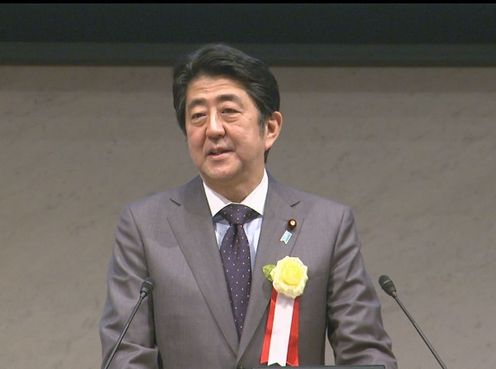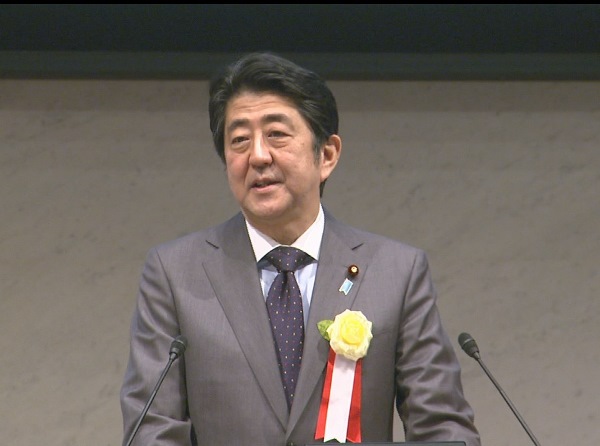Home > News > The Prime Minister in Action > December 2015 > Board of Councillors Meeting of the Nippon Keidanren (Japan Business Federation)
The Prime Minister in Action
Board of Councillors Meeting of the Nippon Keidanren (Japan Business Federation)
December 24, 2015
[Provisional Translation]
Prime Minister Shinzo Abe attended a Board of Councillors Meeting of the Nippon Keidanren (Japan Business Federation), held in Tokyo.
The Prime Minister said in his address,
“Thank you very much for inviting me to attend the fourth Board of Councillors Meeting today.
Three years have passed since I was invited to attend the first Board of Councillors Meeting on the day before my inauguration as Prime Minister. I am grateful for having been able to attend this meeting for four years in a row, in 2012, 2013, 2014, and now in 2015.
Perseverance will make us stronger. Abenomics and the ‘three arrows’ policy have completely restored Japan’s economy. Nominal GDP has increased 28 trillion yen to reach more than 500 trillion yen. We have created more than 1.1 million jobs. The ratio of job offers to job seekers is at its highest level in 23 years. Also, this year will see the largest-ever corporate profits on record again. Wages are the highest they have been in 17 years. According to a survey by Keidanren, winter bonuses also broke previous records. Japan’s economy is almost completely free of deflation. Whether we can further accelerate this trend and realize a positive economic cycle will depend on whether we can raise wages for a third consecutive year and ignite capital investment.
At the Public-Private Dialogue towards Investment for the Future held last month, Keidanren Chairman Sakakibara gave a very positive and bold talk about the future as a representative of the business world. ‘I would like to lobby members to increase wages more than last year,’ again, ‘increase wages more than last year,’ Chairman Sakakibara said. ‘Capital investment will increase by 10 trillion yen across the entire economy over the next three years.’ Given this, the government has greatly stepped forward to develop an environment where companies can easily invest. We decided last year to lower the effective corporate tax rate for the next fiscal year to 31%. However, I have decided to lower this to the 20% range for future fiscal years in response to the strong leadership exhibited by Keidanren Chairman Sakakibara. The soul of Abenomics can be found in speed and execution. In fiscal 2018, we will lower the rate to 29.74%, which is on par with Germany. I would like small- and medium-sized enterprises who have withstood challenging economic conditions to make capital investments with an eye to new growth. Therefore, I have decided to institute the first-ever fixed asset tax reduction for capital investments.
Looking back on the past year, the security environment surrounding Japan has grown much more severe, as various threats occurred including terrorism and natural disasters. For me, the character an, which stands for ‘security’ and selected as the Kanji character for this year, is the Kanji character that represents 2015. Our mission as politicians to protect the lives and peaceful daily lives of the people has now become more important than ever. Without a secure environment in which to pursue economic activities, the effects of Abenomics would not have been felt. This year, after significantly extending the Diet for its longest run in the post-war era, we developed the Legislation for Peace and Security, in addition to dedicating efforts to disaster preparedness measures for volcanic eruptions and torrential rainfall. Furthermore, we recently created the Counter Terrorism Unit - Japan (CTU-J) under the direction of the Prime Minister’s Office and made efforts to strengthen intelligence functions. We will secure a stable electricity supply at affordable prices. We restarted our nuclear reactors without ever comprising safety, and passed legislation for the full liberalization of the electricity and gas retail markets as well as the separation of the power producers and distributors.
Finally, an overall agreement has been reached for the TPP. The TPP is more than just a framework for liberalizing trade. It represents a set of new economic rules made by countries that share the same fundamental values, such as freedom, democracy, basic human rights and the rule of law. The problem lies with who will create an international order suitable to the 21st century. This is truly a grand plan for the long-term future of our nation. Since the agreement in principle for the TPP has been reached, the Republic of Korea, Taiwan, the Philippines, Indonesia and Thailand have shown a very strong interest in joining the TPP. The Asia-Pacific region is an expansive economic area encompassing 800 million people and 40% of the world’s economy. Using this unifying force, the scope to which these new rules are applied will widen. Countries that share the same fundamental values will deepen their economic connections and further expand their reach.
Such an arrangement carries with it a strategic significance in that it will contribute not just to Japan’s national security, but also to stability in the Asia-Pacific region. These new rules protect originality over a broad range of fields, from services to intellectual properties, while ensuring that the degree of quality is correctly evaluated. They have the power to stimulate innovation and create value. The TPP represents a growth strategy not only for Japan, but for the Asia-Pacific region as a whole. The TPP is but a castle in the air if it does not take effect. I hope to work closely with other countries, and to quickly sign the TPP and obtain the approval of the Diet.
Abenomics has entered its second stage. Tax revenues have increased 21 trillion yen at the levels of national and local government compared to before my administration. Such an increase represents the fruit of economic growth. Since I stood here at the end of 2012, national and local tax revenues have increased 21 trillion yen, which was produced together with all of you here. Using these funds, I hope to enable each and every individual in Japan to find their latent abilities and fulfill their dreams. Investments are made for the future, to liberate people’s creativity and encourage innovation. I firmly believe that the dynamic engagement of all one hundred million-plus citizens, valuing each and every individual, represents the ultimate growth strategy. Through a positive cycle of growth and distribution, Japan will seek to achieve the largest GDP in postwar history of 600 trillion yen, realize the desired birthrate of 1.8 children per woman, and reduce the number of people who leave employment to provide nursing care to zero. Next spring I plan on finalizing specific measures within the Plan to Realize the Dynamic Engagement of All Citizens.
Promoting the active participation of women is central to realizing a society in which all one hundred million-plus citizens are each dynamically engaged. This will be the greatest challenge as we move forward. In August of this year the bill on promoting active participation by women was enacted, requiring the planning of measures for hiring and promoting women as well as the development of their capabilities. In February 2016 a training session will be held for female corporate executives led by a Harvard Business School professor. I expect that many more women will be appointed to executive management positions in time for next year’s shareholders’ meetings. I ask that Keidanren Chairman Sakakibara and everyone affiliated with Keidanren continue to exhibit leadership in realizing a society in which all one hundred million-plus citizens are each dynamically engaged.
Over the last three years I have traveled around the world with many of you here today. I have visited 63 countries and regions, and have found that ‘sales efforts at the highest level foster understanding and trust in Japan’s manufacturing culture.’ In Central Asia, the graves of Japanese people who lost their lives while detained there some 70 years ago have been carefully looked after. Despite adversity, these Japanese people held pride in their work, and never cut corners. President Karimov of Uzbekistan told me, ‘The people of Uzbekistan remember the diligent and honest Japanese people, and this is why they take care of their graves.’
Japan’s Shinkansen technology will be applied in India following its success in Taiwan. Prime Minister Modi told me that, ‘Introducing a Japanese Shinkansen will serve as a major catalyst not only for India’s high-speed railway, but also for the modernization of the entire country’s railway system.’ As described in ‘Shitamachi Rocket,’ the popular Japanese book and television program, technology is really about the people. Japan is spreading a culture of reliability and safety to the world through its technologies. As Japan’s technologies spread, people’s trust and favor toward the Japanese people will increase as well.
Actually, your work represents one of the greatest assets in Japanese diplomacy.
Next year Japan will serve as the Chair of the G7 Summit. Leaders from around the world will gather in Ise-Shima. The world faces a number of issues today, including growing uncertainty about the global economy and the fight against terrorism. I would like to lead discussions at the G7 with the hope of finding solutions to these issues.
Next year we will continue to place top priority on the economy. In closing, I once again promise that the Cabinet will push forward collectively with these efforts, and I plan to stand here before you again at the end of next year. I wish you all a very Happy New Year. Thank you.”


